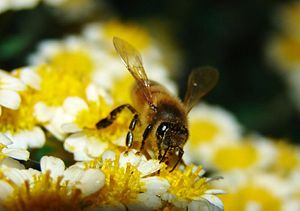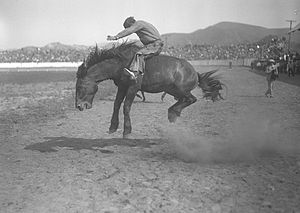 Image via Wikipedia
Image via WikipediaIt’s been one of those weeks when, as a writer, you feel like you’ve been banged up and put away.
Your confidence is sagging. A story isn’t working out the way you want it to. A friendly discussion with an acquaintance has turned into a vitriolic debate. Your students give you feedback that your teaching style (which you’ve been using for the last several semesters) isn’t working. And “real life” obligations remind you there are things your writing can’t “cure”.
And now you’ve got to sit down at the keyboard and actually write something.
So what do you do when your inspiration runs low like the battery on your cellphone?
First, realize that writing has little, if anything, to do with inspiration.
That’s right. Writing is a job, like any other. Whoever heard of fireman’s block? What would happen if a doctor didn’t feel “inspired” to help her patients?
Yet writers often feel they need to receive some sort of magical stimulation in order to do their work.
While writing can be stimulating, those of us who wish to get some compensation and recognition for our work must realize that neither will come if we wait for that magical creature called Inspiration to smile upon us.
As someone in my grad school once said, “Writers write.”
Period.
Second, here are four methods for kick-starting your inspiration:
Write through the problem. Start by writing about the problem. Acknowledge that you're having difficulty.
Knowing that I’ve got to be somewhere else this afternoon and that my writing time is limited, I woke up this morning without a clue what I was going to write about. So I took pen in hand and began writing about how my week went – including the difficulty of writing.
Voila! This method produced the post you are now reading.
Don’t wait for inspiration – seize it! You are the commander of your writing “troops” and this is war! Take action. Now.
Get angry. Nothing provokes a writer to action better than getting angry. Anger leads to passion, and passion makes you want to do something.
Can’t find anything to get angry about? Turn on the news.
Take your muse to breakfast (or lunch or dinner). In his seminal book On Writing, Stephen King says his imaginary muse is a man. Mine’s a woman. Every week, my muse and I trek to a local restaurant, eat breakfast, and write. (No, I don’t order for two.)
This particular restaurant is a little pricey for my tastes, but my muse likes to be treated right – and it works. Many of these blogposts for the last two or three months have originated while my muse and I were munching on eggs, fruit, and Canadian bacon.
If it sounds a little odd to date your muse, deal with it.
Indulge your muse, and your muse will indulge you.
But does indulging your muse produce good results? You be the judge. (I will tell you that January was this blog’s best month so far, at least in terms of page views.)
The old saw says that writing is 90 percent persperation and 10 percent inspiration. If you wait for that 10 percent to come, you’ll slog through your writing until it loses interest for you, let alone your readers.
To borrow from Admiral David Farragut, I say, “Damn the inspiration! Full speed ahead!”
Leave a comment. How do you kick-start your inspiration?




